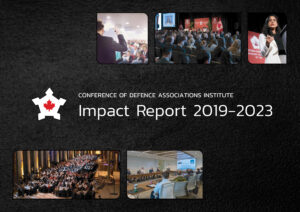in the news
Latest Releases
Be the First to know
Sign up to receive our latest publications and enjoy early bird registration specials for our major events.
Who we Are
Through our flagship events, fellowships, awards, scholarships and other activities, we sustain a community of experts and practitioners who care about Canada’s role in the world and we foster a facts-based, peer-reviewed, and rational approach to Canadian defence and security policy. We field experts in the media and as witnesses to Parliamentary committees.











